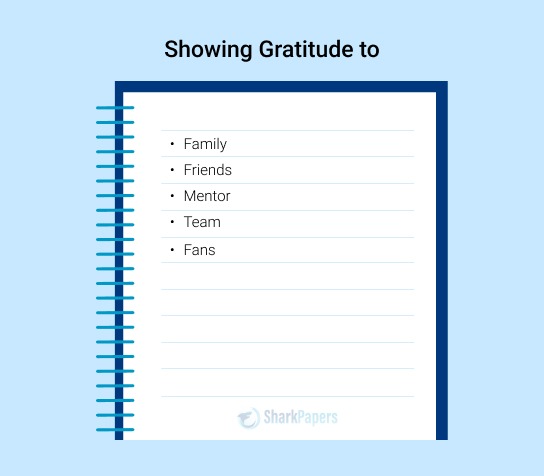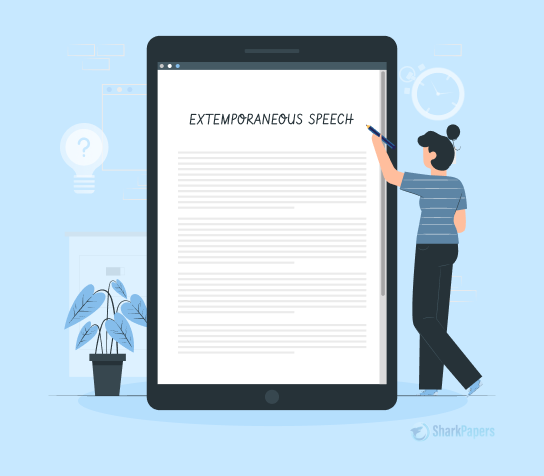What is an Acceptance Speech?
An acceptance speech is a short speech given by someone who has received an award, honor, or recognition. In this speech, the speaker typically thanks those who helped them achieve the recognition.
These people include colleagues, mentors, family, or friends, and may also express what the honor means to them personally or professionally. It’s a moment to show gratitude, share a bit of the journey, and often inspire others.
The acceptance speech is a type of special occasion speech. Some other types related to acceptance speech are:
- Commemorative Speeches (like memorial or graduation speeches)
- Introduction Speeches (introducing a speaker)
- Toast Speeches (at weddings or formal dinners)
Common Occasions for Acceptance Speeches
These occasions provide an opportunity for individuals to express gratitude and reflect on their experiences.
- Award Ceremonies
- Graduation Ceremonies
- Professional Recognitions
- Sports Events
- Scholarship Presentations
- Community Honors
- Retirement Celebrations
- Art Exhibitions or Competitions
- Political Events
- Special Tributes
How to Deliver a Gracious and Impactful Acceptance Speech
Follow the guidelines given below to deliver a purposeful, heartfelt, and humble acceptance speech.
Start with the Basics
When you begin your acceptance speech, it’s important to greet everyone warmly. Say hello to the audience, and thank them for being there to support you. Make sure to acknowledge the organizers or group giving you the award, letting them know how much you appreciate the honor.
You might also want to express your pride in being recognized alongside others who have received this award in the past. If it feels right for you, a little prayer or mention of your beliefs can also be a nice touch.
Share Your Story
Next, take a moment to share your journey. Briefly talk about how you got to this point in your life or career. This could be a story about what inspired you, a personal reflection, or a funny moment that stands out.
Including a bit of humor or charm can help make a connection with the audience, so don’t be afraid to let your personality shine through.
Thank Others
As you move along in your speech, it’s important that you acknowledge the many people who helped you along the way. Let the audience know that your success isn’t just yours alone; it’s the result of support from many others.
While you don’t need to list everyone right now, make sure to highlight how your family—especially your parents—played a significant role in your journey.
Recognize Those Who Helped You Grow
When you thank people who helped you develop, start with the ones who made the biggest impact on your life. Share a little about why they’re special to you. As you continue, you can start grouping others together by saying things like, “Thanks to all my great coaches.”
This way, you can thank more people while keeping your speech concise. Don’t forget to include a shout-out to the fans and supporters who cheered you on throughout your journey!
Thank Your Family Again
Your family deserves special mention, so take a moment to express your gratitude to them. Thank your family members for their support and all they’ve sacrificed for you. Share a few words about what they mean to you and how they’ve stood by you through tough times.
Share Some Advice (If You Want)
If you feel inspired, consider sharing a piece of advice or a lesson you’ve learned throughout your journey. This is a great opportunity to tie back to the story you told earlier. Just make sure your advice is simple and easy to understand, so everyone can relate to it.
Wrap It Up with More Thanks
As you come to the end of your speech, be sure to reiterate your appreciation for everyone in the room. Thank them again for their support, and emphasize how much it means to you.
You might also want to encourage a sense of team spirit by mentioning how excited you are to keep succeeding together in the future.
How Long Should An Acceptance Speech Be?
An acceptance speech should usually be around 2 to 5 minutes long. This gives you enough time to thank people and share a few thoughts without losing the audience's attention. If you have a lot of people to thank or a special story to tell, you can go closer to 5 minutes.
Acceptance Speech Examples
With this helpful list of examples, it will be easy to get inspired for your next acceptance speech. These professionally written pieces can give you some great ideas on what kind of content is appropriate for an ultimate honor moment.
Some Famous Acceptance Speeches
Following are some famous and well-known acceptance speeches. Give them a read and you’ll know how influential people win people’s hearts with impressive acceptance speeches.
- Martin Luther King Jr. Acceptance Speech - Nobel Peace Prize Acceptance Speech (1964): King addressed the struggle for civil rights and the importance of nonviolence in achieving justice.
- Meryl Streep Acceptance Speech - Golden Globe Award Acceptance Speech (2017): Streep spoke about the significance of the arts and storytelling, highlighting the need for unity and empathy in society.
- Barack Obama Acceptance Speech - Democratic National Convention Acceptance Speech (2008): Obama emphasized hope, change, and unity as he accepted the Democratic nomination for president, inspiring millions.
- Acceptance Speech Kamala Harris - Vice Presidential Acceptance Speech (2020): In her speech, Harris celebrated the significance of her nomination, addressing issues of justice, equality, and the power of democracy, while inspiring future generations.
Tips for Writing Successful Acceptance Speeches
As you prepare to write, keep these helpful tips in mind to enhance your acceptance speech.
- Choose a Central Message: Decide on a core message or takeaway you want the audience to remember, and structure your speech around it.
- Use Active Voice: Write in the active voice to make your speech more direct and engaging. This helps create a stronger impact.
- Incorporate Quotes: Use a relevant quote that resonates with your experience or the award to add depth and inspiration.
- Be Mindful of Tone: Match your writing style to the occasion. Use a tone that reflects the formality of the event while still being personal.
- Visualize Your Audience: While writing, imagine speaking to your audience to help tailor your language and examples to their interests and experiences.
- Break Up Long Sections: Use short paragraphs and bullet points for clarity, especially if you’re listing people to thank or achievements.
- Limit Length: Aim for a speech length of 2 to 5 minutes, and focus on the most impactful content to maintain the audience’s attention.
Wrap up,
The acceptance speech is the perfect opportunity for you to express gratitude by thanking awarding individuals. With the help of this blog, we’re hopeful that you feel confident in preparing your acceptance speech now.
But not every good speaker also has great writing skills, people often hire professional writers who can help them create an engaging speech.
If you are one of them, then simply consult SharkPapers.com by asking, 'write my paper for me'. We offer professional assistance at affordable rates.
Consult our speech writing service now and get a well-written speech in no time.











 Not seeing it? Check Promotions or Spam — inboxes get protective.
Not seeing it? Check Promotions or Spam — inboxes get protective.